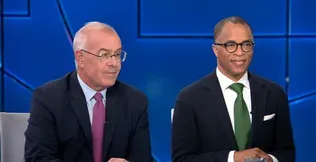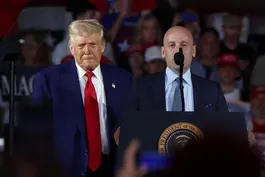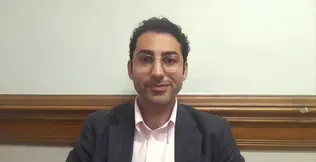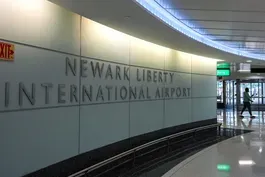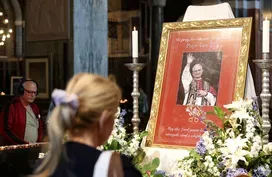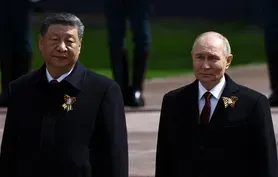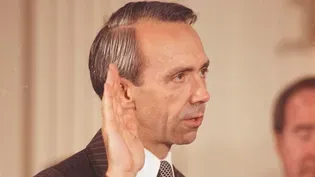
India's U.S. ambassador on escalating conflict with Pakistan
Clip: 5/9/2025 | 7m 11sVideo has Closed Captions
India's U.S. ambassador discusses the escalating conflict with Pakistan
Tensions are escalating between India and Pakistan after both sides exchanged heavy cross-border shelling along the de facto border in Kashmir. We spoke earlier this week with the Pakistani ambassador. To get India’s perspective, Geoff Bennett spoke with Indian Ambassador to the U.S. Vinay Kwatra.
Problems with Closed Captions? Closed Captioning Feedback
Problems with Closed Captions? Closed Captioning Feedback
Major corporate funding for the PBS News Hour is provided by BDO, BNSF, Consumer Cellular, American Cruise Lines, and Raymond James. Funding for the PBS NewsHour Weekend is provided by...

India's U.S. ambassador on escalating conflict with Pakistan
Clip: 5/9/2025 | 7m 11sVideo has Closed Captions
Tensions are escalating between India and Pakistan after both sides exchanged heavy cross-border shelling along the de facto border in Kashmir. We spoke earlier this week with the Pakistani ambassador. To get India’s perspective, Geoff Bennett spoke with Indian Ambassador to the U.S. Vinay Kwatra.
Problems with Closed Captions? Closed Captioning Feedback
How to Watch PBS News Hour
PBS News Hour is available to stream on pbs.org and the free PBS App, available on iPhone, Apple TV, Android TV, Android smartphones, Amazon Fire TV, Amazon Fire Tablet, Roku, Samsung Smart TV, and Vizio.
Providing Support for PBS.org
Learn Moreabout PBS online sponsorshipGEOFF BENNETT: Tensions are escalating tonight in South Asia.
India and Pakistan exchanged drone strikes and shelling along the de facto border in Kashmir.
Explosions heard in India-administered Kashmir, as India accused Pakistan of launching drone attacks for a second straight night.
Pakistan has denied using drones, but vowed to retaliate against Indian airstrikes earlier this week that hit several Pakistani cities, killing more than two dozen people.
India says those strikes were aimed at terrorist infrastructure in response to a terrorist attack last month in Indian-administered Kashmir that killed 26 people.
We spoke earlier this week with the Pakistani ambassador.
To get India's perspective, we're joined now by India's Ambassador to the U.S. Vinay Kwatra.
Mr.
Ambassador, thank you for being here.
VINAY KWATRA, Indian Ambassador to the United States: Thank you for hosting me.
Thank you very much.
GEOFF BENNETT: And starting with some breaking news, we have confirmation from Pakistan's military this evening of Indian missile strikes on Lahore and Rawalpindi.
What more can you tell us about that?
VINAY KWATRA: Yes, look, I don't know what is the basis on which the Pakistan side is sharing this information, but I would rather not speak to the operational details.
But I think the way you read the preface to your question in terms of describing the tensions between India and Pakistan, I think well before the recent round of drone exchanges started happening last night, early morning, day before last night, previous early morning, I think, as you very rightly observed, the killing of 26 civilians on 22nd of April by four terrorists with clear linkages, support base and training facilities in Pakistan and Pakistan-occupied Kashmir was the starting point.
The attack took place in Pahalgam in India.
I would say not Indian-administered Jammu and Kashmir.
It is India's Kashmir.
India -- Jammu and Kashmir is an integral part of India.
The only aspect that has yet to be resolved is the return of Pakistan-occupied Kashmir to us.
Be that as it may, so it started on 22nd of April.
I'm sure the viewers would like to know that the killings were carried out in the most brutal manner, based on the religion.
All the non-Muslims were shot in the head in front of their wives, in front of their innocent children.
That was the start.
We waited 15 days, expecting, hoping that Pakistan would act against these terrorist bases, terrorists in their country.
Nothing happened.
We even started receiving intelligence reports that there might be more impending terrorist attacks on India.
So, on 6th -- night of 6th May, 7th May, we launched a very protracted, limited attack on nine sites in Pakistan and Pakistan-occupied Kashmir linked to terrorists, linked to terrorist training camps, linked to training terrorist-integrated facilities, where they train them, arm them, equip them, organize them.
That was the purpose with which the strikes were launched.
With that, we closed the chapter on our side; 22 April was the trigger.
We responded.
The matter from our side was closed.
We are not interested in what Pakistan is doing vis-a-vis other countries.
We were only interested in bringing terrorists to justice, holding them accountable, and giving justice to the victims of the terror.
And that's what we did.
Day before yesterday, Pakistan did some military engagement through drones.
We responded.
Matter closed.
Yesterday night, this morning, we did a drone engagement.
We engaged, matter closed.
So, from our side, it has always been about terror and holding terrorists accountable and bringing justice to the victims.
We have no intention of going in any other direction.
But should we, should Pakistan be proactive?
I have no option but to respond and insofar as our attack on Pakistan's soil is concerned on these terrorists.
GEOFF BENNETT: So I hear you say that the response is proportional.
With both nations possessing nuclear capabilities, what measures is India taking to prevent further escalation and to promote regional stability?
VINAY KWATRA: Yes, I think we have not taken any step in this entire episode since 22nd of April to which you could call escalation.
We have only responded to the escalation that was thrown at us.
We have not indulged in warmongering.
We have not indulged in aggressive rhetoric, which we have heard from the other side, because for us, it has always been about holding terrorists accountable and bringing justice to the victims.
We have scrupulously excluded military installation from our attacks.
We have scrupulously excluded economic and social infrastructure from attack.
And the simple reason is because our focus is on terrorism and, as I said, taking out these people who have really carried out the most heinous of crimes on the Indian soil, and these terrorists are backed by facilities in Pakistan.
Look at the -- I mean, if one was to put it in very simplistic terms, four terrorists with clear linkages backing in Pakistan come into India, kill 26 civilians.
Any self-respecting country should and must and will respond to such terrorists.
That's what we did.
GEOFF BENNETT: In the minute we have left, a minute -- a question about the role of international actors, because, as I'm sure you know, Vice President J.D.
Vance said on FOX News yesterday that this war is -- quote -- "fundamentally none of our business," none of the U.S.' business.
How does India view the role of the U.S., the U.N., international actors in mediating or facilitating dialogue between India and Pakistan?
VINAY KWATRA: Since you have little time left, three very sharp, crisp things.
One, deeply grateful to the U.S. leadership, to President Trump, and to bipartisan strong support which has come in India's favor from the U.S.
The president spoke to my prime minister within hours of the terrorist attack, condemned the attack, full-hearted support to India.
Same -- Vice President J.D.
Vance was in India when the attack unfolded.
He spoke to the prime minister the next day, condemned the attack, offered full support, strong bipartisan support from the congressmen, senators, full support, no issues.
I think the only -- the best thing that the international community, the U.S. and other countries of the world can do is to impress upon Pakistan to stop supporting terrorism.
That's all that's needed, and everybody will be at peace with each other.
GEOFF BENNETT: Ambassador Kwatra, thanks again for your time this evening.
VINAY KWATRA: Thank you very much for your time.
Thank you for hosting.
Brooks and Capehart on Pope Leo's impact on U.S. politics
Video has Closed Captions
Clip: 5/9/2025 | 10m 44s | Brooks and Capehart on Pope Leo XIV's potential impact on U.S. culture and politics (10m 44s)
Miller suggests suspending habeas corpus to deport migrants
Video has Closed Captions
Clip: 5/9/2025 | 3m 55s | Top Trump adviser suggests White House could suspend habeas corpus to deport migrants (3m 55s)
Mohsen Mahdawi says release shows democracy is functioning
Video has Closed Captions
Clip: 5/9/2025 | 8m 5s | 'This is a light of hope': Mohsen Mahdawi says release shows democracy is functioning (8m 5s)
News Wrap: Newark airport suffers another radar outage
Video has Closed Captions
Clip: 5/9/2025 | 4m 47s | News Wrap: Newark airport suffers another radar outage (4m 47s)
Pope Leo's longtime friend on what to expect from his papacy
Video has Closed Captions
Clip: 5/9/2025 | 6m 48s | Pope Leo XIV's longtime friend shares insights on what to expect from his papacy (6m 48s)
Putin uses WWII celebration to strengthen ties with China
Video has Closed Captions
Clip: 5/9/2025 | 5m 23s | Putin uses Russia’s WWII celebration to strengthen alliance with China (5m 23s)
Remembering David Souter and his Supreme Court legacy
Video has Closed Captions
Clip: 5/9/2025 | 4m 20s | Remembering Justice David Souter and his Supreme Court legacy (4m 20s)
Providing Support for PBS.org
Learn Moreabout PBS online sponsorshipSupport for PBS provided by:
Major corporate funding for the PBS News Hour is provided by BDO, BNSF, Consumer Cellular, American Cruise Lines, and Raymond James. Funding for the PBS NewsHour Weekend is provided by...
